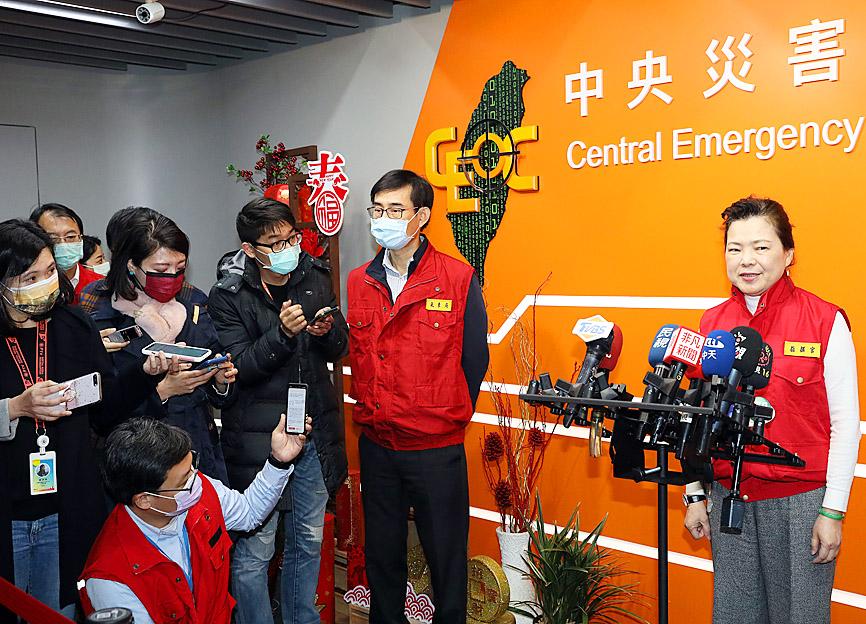Water pressure in Taichung, and Hsinchu and Miaoli counties is to be reduced around the clock, the Ministry of Economic Affairs said yesterday.
In addition, large non-industrial water users will have to cut daily consumption by 20 percent, it said.
“The reservoirs in those regions are now less than 20 percent full,” Minister of Economic Affairs Wang Mei-hua (王美花) said after a meeting at the Central Emergency Operation Center on the nation’s water situation. “We have decided that it is necessary to step up water conservation efforts.”

Photo: CNA
Prior to the new measures taking effect yesterday, water pressure in the three areas had been lowered from 10pm to 6am daily, while large non-industrial users, such as pools and car washes, had to reduce daily use by 10 percent.
Industrial users will continue to have to cut daily consumption by 11 percent, the ministry said.
With no typhoons last year and water reserves low, Taichung and Tainan, as well as Hsinchu, Miaoli and Chiayi counties, have been placed under “orange alert,” which entails limiting total water use and reducing water pressure.
Taoyuan and Kaohsiung, and Nantou and Changhua counties are on “yellow alert,” which means reduced water pressure, but no obligation for large users to reduce daily usage, the ministry said.
Emergency wells and an emergency desalination plant have been brought into service to provide a small amount of steady water per day, the ministry said.
As up to 70 percent of the nation’s water supply goes to agriculture, irrigation has also been halted over most of the nation, affecting the first rice harvest this year, it said.
As the world is already in the middle of a semiconductor crunch, all eyes are on how the water shortage might affect Taiwanese chip manufacturers.
Last month, Taiwan Semiconductor Manufacturing Co (TSMC, 台積電) and United Microelectronics Corp (UMC, 聯電) started trucking water daily to their facilities. The two companies have reduced their daily water consumption by 11 percent, local news outlets reported.
If the water supply problem does not improve, a “red alert” would be issued, which would see phased water stoppages, with daily use getting top priority, followed by the medical, defense and industrial sectors, the ministry said.
The nation is likely to remain under a dry spell until May, when the rainy season begins, it said.

INVESTIGATION: The case is the latest instance of a DPP figure being implicated in an espionage network accused of allegedly leaking information to Chinese intelligence Democratic Progressive Party (DPP) member Ho Jen-chieh (何仁傑) was detained and held incommunicado yesterday on suspicion of spying for China during his tenure as assistant to then-minister of foreign affairs Joseph Wu (吳釗燮). The Taipei District Prosecutors’ Office said Ho was implicated during its investigation into alleged spying activities by former Presidential Office consultant Wu Shang-yu (吳尚雨). Prosecutors said there is reason to believe Ho breached the National Security Act (國家安全法) by leaking classified Ministry of Foreign Affairs information to Chinese intelligence. Following interrogation, prosecutors petitioned the Taipei District Court to detain Ho, citing concerns over potential collusion or tampering of evidence. The

‘FORM OF PROTEST’: The German Institute Taipei said it was ‘shocked’ to see Nazi symbolism used in connection with political aims as it condemned the incident Sung Chien-liang (宋建樑), who led efforts to recall Democratic Progressive Party (DPP) Legislator Lee Kun-cheng (李坤城), was released on bail of NT$80,000 yesterday amid an outcry over a Nazi armband he wore to questioning the night before. Sung arrived at the New Taipei City District Prosecutors’ Office for questioning in a recall petition forgery case on Tuesday night wearing a red armband bearing a swastika, carrying a copy of Adolf Hitler’s Mein Kampf and giving a Nazi salute. Sung left the building at 1:15am without the armband and apparently covering the book with a coat. This is a serious international scandal and Chinese

Seventy percent of middle and elementary schools now conduct English classes entirely in English, the Ministry of Education said, as it encourages schools nationwide to adopt this practice Minister of Education (MOE) Cheng Ying-yao (鄭英耀) is scheduled to present a report on the government’s bilingual education policy to the Legislative Yuan’s Education and Culture Committee today. The report would outline strategies aimed at expanding access to education, reducing regional disparities and improving talent cultivation. Implementation of bilingual education policies has varied across local governments, occasionally drawing public criticism. For example, some schools have required teachers of non-English subjects to pass English proficiency

TRADE: The premier pledged safeguards on ‘Made in Taiwan’ labeling, anti-dumping measures and stricter export controls to strengthen its position in trade talks Products labeled “made in Taiwan” must be genuinely made in Taiwan, Premier Cho Jung-tai (卓榮泰) said yesterday, vowing to enforce strict safeguards against “origin laundering” and initiate anti-dumping investigations to prevent China dumping its products in Taiwan. Cho made the remarks in a discussion session with representatives from industries in Kaohsiung. In response to the US government’s recent announcement of “reciprocal” tariffs on its trading partners, President William Lai (賴清德) and Cho last week began a series of consultations with industry leaders nationwide to gather feedback and address concerns. Taiwanese and US officials held a videoconference on Friday evening to discuss the